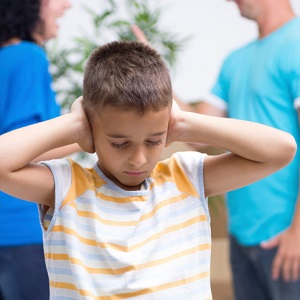 Is the trauma children typically experience when divorce occurs in the family due to the divorce itself or other factors that surface around the divorce between the parents?
Is the trauma children typically experience when divorce occurs in the family due to the divorce itself or other factors that surface around the divorce between the parents?
To a marriage and family therapist, this is an important question. If mental health professionals know specifically what it is about the process of divorce in the family that is traumatic for children, the trauma can be lessened to a great degree by addressing the specific factor(s) that children who experience divorce in the family are confronted with.
Many children experience the process of divorce in their families. During the 1970s and ’80s, the pop psychology was that parents should not stay together for the sake of the children. The theory was, “If the parents aren’t happy, the children will not be happy.” While that is most likely true, research has shown that there are, in fact, traumatizing effects that divorce can have on children.
However, the divorce itself does not appear to be the only factor that is traumatic for children when the divorce process takes place. Other factors, such as not seeing one of the parents as often, the parents transitioning into new relationships, changes in the socio-economic status of the family, and the constant transition from one parent’s house to the other parent’s house can also be difficult adjustments for children who experience divorce.
Generally, children are very adaptable when they have enough support. When children who experience divorce do not have an appropriate amount of support and they reflect back on the situation, they often recall experiencing difficulty that they possibly did not realize they were experiencing at the time.Some factors for parents to consider when children experience divorce in the family:
- There should be as little conflict as possible between the parents, especially in front of children. When children witness their parents in conflict, they often attribute the cause of the conflict to something they did wrong. Each parent should avoid criticizing the other.
- Parents must be extremely careful when entering into a new relationship. They must ensure that the person they are entering the relationship with is open to accepting the extended family, including both biological parents of the children. This would also mean accepting the ex-spouses. Whether the parents and the new partners in their relationships like it or not, they are, in fact, extended family. It is in the best interest of the child(ren) that everyone involved be accepting of one another while setting and respecting clear boundaries. This also models healthy boundaries for future relationships.
- The time each parent spends with the child(ren) needs to be as equitable as possible.
- When spending time with one of the parents, children should feel free to contact the other parent if desired, and to have their privacy respected.
- Parents must recognize that their relationship is not ending when they divorce; it is changing. They will always be in a parenting relationship and must collaborate as a team.
- Each parent should have a caring attitude toward the other biological parent. Children need to know that their parents care about each other, as it reflects that the parents also care about the child(ren), which increases the child(ren)’s self-esteem.
- Both parents should attend events such as parent/teacher conferences, school plays, sports activities, and other types of activities that the children are involved in as much as possible. Children need to know both parents are invested in supporting their success.
- Parents should ensure they live close enough geographically so that they are both easily accessible to the children; that being said, it is also important to have clear boundaries and show respect for the other parent’s personal life.
- Parents must be able to communicate consistently about their child(ren)’s emotional development, health issues, academic progress, etc., and be committed to supporting one another in their role as parents.
- Parents must be careful to avoid using the child(ren) as a messenger. They should communicate directly and avoid asking the child(ren) for information about the other parent’s personal life.
- The child(ren) should know that they can turn to both parents when/if they need to problem solve.
- Parents need to ensure that they have adequate and quality one-on-one time with their child(ren) and are as present in the moment as possible … in other words, children need to have a sense that they have a parent’s undivided attention when spending quality one-on-one time together.
When parents have appropriate support systems in place for each other and the children while maintaining clear boundaries, the process of divorce is much less traumatizing for children. Ideally, in time, both parents can move forward with their lives and into healthy relationships with the outcome being extended family relationships that are loving and supportive of one another. Ideally, the children should have the perspective that they did not lose their family, but that their family changed and that the parents have the children’s best interests at heart.

The preceding article was solely written by the author named above. Any views and opinions expressed are not necessarily shared by GoodTherapy.org. Questions or concerns about the preceding article can be directed to the author or posted as a comment below.

 Individuation and Children of Divorce: When Daddy Doesn't Care
Individuation and Children of Divorce: When Daddy Doesn't Care After Gray Divorce: Maintaining Emotional Connection to Adult Children
After Gray Divorce: Maintaining Emotional Connection to Adult Children When Divorce Is Right
When Divorce Is Right

Please fill out all required fields to submit your message.
Invalid Email Address.
Please confirm that you are human.
Leave a Comment
By commenting you acknowledge acceptance of GoodTherapy.org's Terms and Conditions of Use.